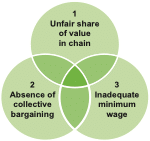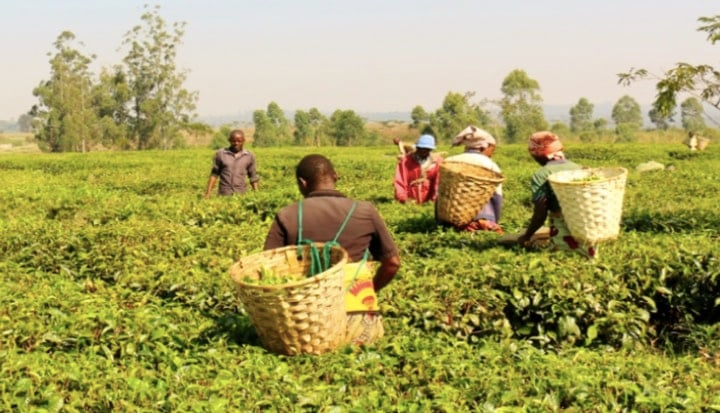Living wage has been a key focus of Oxfam’s work on labour and human rights. We published a series of briefing papers that captured common challenges and promising solutions. Living wage has also been part of the scorecard indicators for Oxfam’s Behind the Brands and Behind the Barcodes campaigns. Importantly, we have worked with companies and Oxfam country teams to learn from direct engagement with people on the ground. Here we share some of the key learning from working with businesses in three different products and geographies that all businesses can take on board when working on living wage.For over a decade now Oxfam has been listening to and working with workers on how their income impacts their lives. We have seen that where they have salaries that meet their needs, workers are likely to perform better, gain new skills, take less sick leave, be more motivated, and remain loyal to the company. Paying a living wage reduces absenteeism and staff turnover, thereby improving business productivity and profit. In short, paying a living wage is good for business, workers, and ultimately wider stakeholders including communities and governments. Yet living wages remain beyond the reach of many workers worldwide, keeping millions locked in a cycle of poverty. Women workers are particularly vulnerable to low wages, receiving on average 25-30% less pay than men for the same job.
Lessons learned working with companies and workers in Morocco, Vietnam and Malawi
Moroccan strawberries
In Morocco, Oxfam found that female strawberry pickers faced numerous violations of their rights, including harassment by labour providers, dangerous transport and below-minimum wages (let alone a living wage). As a result, Oxfam joined up with UK supermarkets to tackle these issues through the Better Strawberries programme.
Crucially it was workers themselves, supported by local NGOs, who set the priorities: they undertook training on their rights as well as literacy classes. After several years of incremental progress, more women workers report that they are on contracts (enabling them to predict their work pattern and income), no longer accept jobs on less than the minimum wage and are claiming entitlements from the government which mitigate the precariousness of casual farm work . While the gap likely remains between actual and living wages, these improvements brought positive impact on these workers and reduced the size of the gap.
Vietnam manufacturing
In the context of an advocacy engagement with Unilever to enhance its social impact, Unilever and Oxfam agreed to assess the gap between the company’s labour rights policies and the reality on the ground for workers. Unilever provided unprecedented access to its staff and suppliers in Vietnam and Oxfam designed and delivered the study. We found that wages in the company’s own factory were well above the minimum wage but below a living wage and in the supply chain, low wages, excessive working hours and insecure work were common.
A progress review in 2016 found positive changes in policy and practices with some improvement in worker voice, higher wages and more direct employment (of male workers). It also identified barriers to further progress: Unilever’s business practices, weak legal regulatory standards and the company’s lack of strategy to achieve fair and equal treatment for women. Unilever initiated an effort to address these barriers and, early in 2021, it announced targets to achieve a Living Wage in its first tier supply chain by 2030 and a commitment to engage vulnerable workers including women.
Malawi tea
In 2013, through a study with the Ethical Tea Partnership and IDH, Oxfam found that wages for tea pluckers in Malawi were below the extreme poverty line of $1.25 a day despite the fact that their wages met the legal minimum, “in-kind benefits” were being provided and tea estates were certified by Rainforest Alliance or Fairtrade. A multi-stakeholder initiative, Malawi Tea 2020 followed, aiming to close the gap between wages and a Living Wage by 2020. A Living Wage benchmark study by experts Richard and Martha Anker, helped frame the programme’s roadmap.
The results have been significant including: the first collective bargaining agreement in 90 years giving a voice to more workers and raising wages well above Malawi’s very low minimum wage; a Sustainable Procurement Tool for buyers to make an additional contribution to close the wage gap; wages increasing in real terms for 50,000 workers and the living wage gap closing by one third by 2020. While it was not the 100% gap closure that we hoped, it was a large achievement in a space in which many initiatives have had negligible effects.
Key Learnings:
· Top-level commitments and frameworks help to create an enabling environment for living wages
· Multiple linked interventions and engagement of many stakeholders (especially workers) are required
· Shifts in business practices resulting in more equitable sharing of value need to happen
More progress is possible
Over the last decade, we have seen many initiatives emerging to measure, and progressively close, the gap between actual wages and a living wage to workers in global supply chains, but little real progress has been made. Oxfam’s experience confirms that the challenges to achieving a living wage in supply chains are substantial: from value being unfairly shared along the supply chain (which is directly linked to companies’ business practices and business models), to an absence of collective bargaining (associated with weakened worker representation and voice) and legal minimum wages that fall short of the cost of living in many countries.

Figure 1 – Barriers to paying a Living Wage to workers in supply chains
However, our experience also shows that progress is possible, and it requires a combination of different strategies.
We learned that top-level commitment and national accreditation schemes like that of the UK Living Wage Foundation and the forthcoming Living Wage for US create an important enabling environment.
We also learned that a series of linked interventions and the engagement of a multitude of stakeholders needs to be activated: C-suite buy-in; aligned procurement practices; strengthened worker bargaining; increases in the legal minimum wage; stakeholder alignment around credible Living Wage benchmark methodologies; changes by certification bodies; engagement by investors; NGO campaigns and developing new business models that more equitably share value along the supply chain.
Living wage will remain a prominent focus area for Oxfam’s work on workers’ rights in the years to come. We encourage companies to embark on this journey and share their learnings with the wider community through
- Gaining an accurate understanding of prevailing wages in their supply chains;
- Measuring the gap between existing wages and credible living wage benchmarks;
- Engaging with suppliers, workers and industry peers to close the gap;
- Developing new business models that make paying living wages sustainable and
- Sharing the challenges and learnings from these processes.
Oxfam is committed to working with and supporting businesses as they confront these challenges. We welcome companies to get in touch and discuss how we can partner together to make these changes happen.
The Oxfam Business Advisory Service supports companies to improve their impact in global supply chains. We enable businesses to access the wealth of experience and expertise within Oxfam to strengthen corporate human rights, labour rights and gender strategies, policies, implementation and impact. For more information contact Monica Romis at mr*****@ox***.uk.










